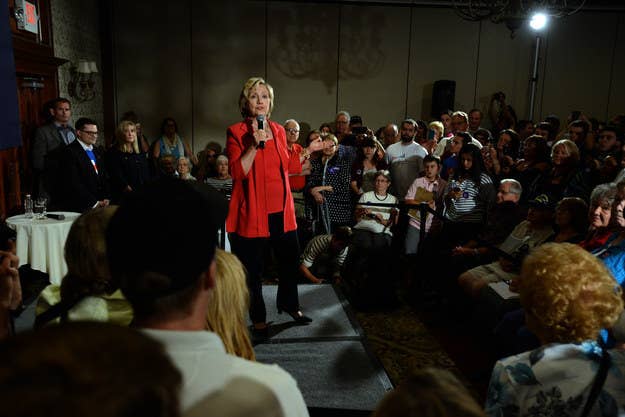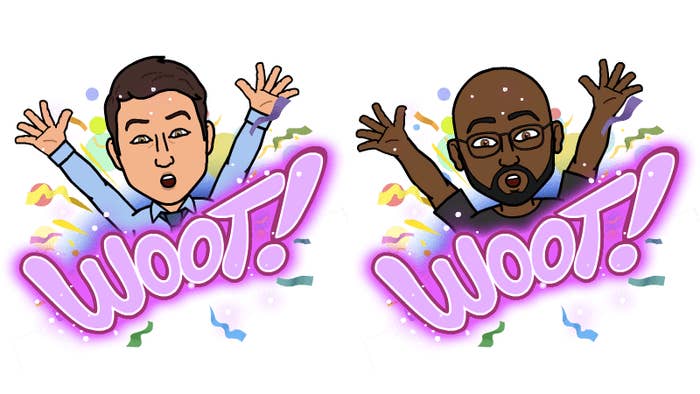
On Day One, Hillary Clinton climbed aboard her Secret Service seven-seater and headed for I-80 West, Iowa-bound.
It was a fun idea. And after the long slog of the first Clinton campaign, “Fun” appeared to be in high demand this time around. There was a fun nickname for the van (“Scooby”) and fun tweets from the road (“She loves her Scooby van,” read one from communications director Jennifer Palmieri). Upon her arrival in Iowa, Clinton told reporters that, yes, the road-trip had been fun. “I had a great drive,” she said.
All week, this was the message. At her first campaign stop, in response to a question about her strategy, Clinton said, “I’m having a great time.” Later that afternoon: “We’re having the best time.” Next day: “I’m having a great time.” In the Des Moines Register, as if to confirm these statements, an Iowa-based Clinton aide assured, “She really had fun.”
Five months later, the campaign is bigger, faster, and far more mired in challenges. But even when appearances suggest otherwise, Clinton has said the good times keep coming. In August, she had a “great time” at the Iowa State Fair, surrounded by a crush so thick that conversation with voters was nearly impossible. In July, she had a “great time” at a parade in New Hampshire, just paces from a heckler screaming insults. And on Saturday, she was still having a great time — even after all the hand-wringing of the summer… her poll numbers, dropping… her favorability ratings, worse than in 2008… her lead in New Hampshire, erased by Bernie Sanders… and her emails, still dominating news coverage, week after week.
One day last month, when a reporter asked her again and again, Did you wipe your server, Clinton shot back, visibly frustrated: “What, like with a cloth or something?” And following week, urged by aides, Clinton returned to the subject again — this time with a contrite tone and quasi-apology for the server setup. By then, reporters had developed a shorthand reference for these and other developments: The summer of 2015, they wrote, had become Clinton's “summer of discontent.”
The Democratic frontrunner is perhaps the most beleaguered candidate of the season. But on Saturday, at a press conference in Portsmouth, N.H., Clinton did not hesitate when asked if she considered herself a “joyful candidate.”
“I do,” she said. “I do.”
In her reply, Clinton outlined a view of joyful politics that has little to do with the headlines, the polls, or the mass crowds that stalk her at state fairs and parades. She does not glorify the grind of the campaign trail — or revel in the back-slapping and glad-handing of the game. Clinton's approach as a candidate hinges, she said, on conversations with voters, toward an end. She described the process in methodical, results-oriented terms: listen, identify a problem, propose a solution, get it fixed.
“I am a problem-solver,” Clinton said. “That gives me a lot of energy and a lot of satisfaction.”
In the first month on the trail, for instance, Clinton heard repeated concerns about substance abuse and mental health. Voters in Iowa and New Hampshire raised the issues with such frequency that she vowed to make them a "big part" of her campaign. And last week, Clinton unveiled her plan — a $10 billion policy proposal.
“That’s what gets me up in the morning: What can I do and what will I do every day as president to try to make life better, so that by the time I end, the American people are better off than when I started,” she continued. “I have a very clear metric.”
As political brand, “problem-solver” hasn’t always translated across the frequencies of public life as easily as Bill Clinton’s inexhaustible political hunger. The couple’s close friend, Diane Blair, took note in November of 1996 that, about three weeks after the reelection campaign, Hillary still needed time “to relax and read.” Blair observed that Bill, on the other hand, “‘relaxes’ by touring, shaking hands, meeting new people.” And when Hillary doesn’t join him, she is cast publicly as “‘brooding, nursing her psychic wounds.’ Bullshit,” Blair wrote in private notes about the Clintons that have since been made public.
Twenty years later, not a lot has changed.
Where he is energized by the campaign trail, she can tire of a process she’s called the most “grueling” of any democracy. In speeches, Clinton occasionally tells voters how much she deliberated about the decision to undergo a second presidential campaign. “Especially with my new granddaughter,” Clinton said in Iowa this summer. She thought, “‘maybe, you know, this was something I should let pass.’”
“Look,” Clinton said this Saturday, “when you run for any office it’s a very challenging experience. Some days are better than other days. But from my perspective, I really like listening to people. I like getting out and talking and figuring out what’s on people’s minds.”
There is a long, and declining tradition of “joyful” campaigning in American politics. In the 1920s, Al Smith was christened the “Happy Warrior,” a grateful participant in the great electoral contest. And in 1968, Hubert Humphrey launched his presidential campaign on a call for “the politics of joy.”
A more recent addition to these optimists is Jeb Bush. His decision to run for president, he has said, came down to a single question: “Can I do it joyfully?” Bush has since cast himself as the “joyful tortoise” in the Republican primary. Accordingly, Donald Trump — perhaps the “hare” in this metaphor — has responded by repeatedly stating that Bush is “low-energy.”
On Saturday, Clinton said that she, too, is running a joyful campaign. In an email, the Bush campaign spokesman, Tim Miller, provided a comment in the form of two pictures: the first, a grinning Bush, backdropped by a “Jeb!” campaign sign; the second, a frowning Clinton. Miller had nothing more to add.

Meanwhile, after the press conference in New Hampshire, Clinton's team volunteered evidence of their joyful campaign: cartoon depictions of Nick Merrill and Marlon Marshall, two aides, as rendered by the app, Bitmoji. In the images, Merrill and Marshall both look joyful. “Woot!” they exclaim. (The campaign has been experimenting with the popular app, which allows users to create custom comic-style emojis.)
Palmieri, the communications director, joined in. “Joyful moments,” she tweeted with a picture of the candidate, lost in a circle of fans in downtown Portsmouth.
Before leaving, Clinton told reporters she was ready for the next phase of the campaign, “making the Labor Day turn” to “the finish line.” There will be more policy problem-solving — and of course all the other problems, less easily resolved: more email releases, more server stories, more tightening polls. More of the grind.
“And off we go, joyfully!” Clinton said with a wave.
